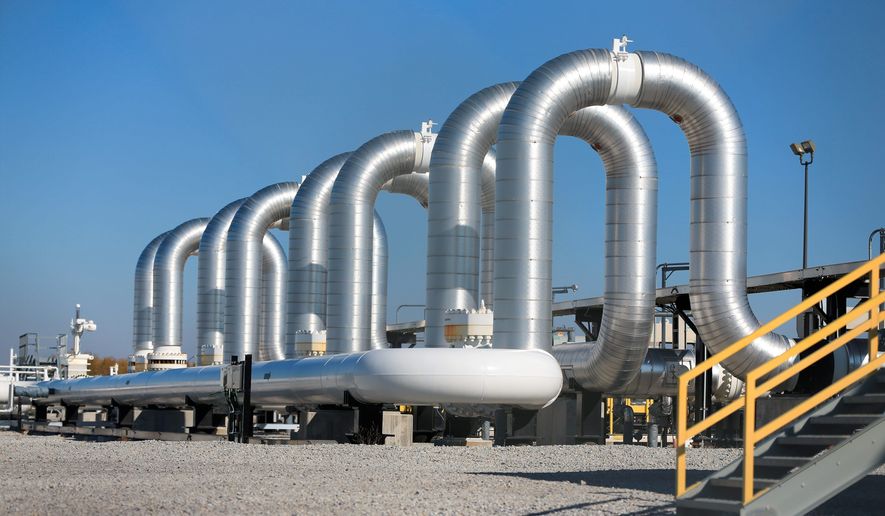Green groups promise guerrilla warfare tactics to stop Keystone pipeline
Plan guerrilla tactics used in Dakota battle
By Ben Wolfgang - The Washington Times - Updated: 10:00 a.m. on Monday, March 27, 2017
Environmental activists vowed over the weekend to fight the Keystone XL oil pipeline to the bitter end, insisting the Trump administration’s approval of the long-delayed project will not be the final word.
Powerful green groups are launching a two-pronged strategy to block the pipeline in the streets and in the courts. First, they intend to use a state review process in Nebraska — where Keystone still does not have a legal route, despite federal approval of the project — to delay any movement forward.
Nebraska state officials charged with approving the pipeline’s path say a decision shouldn’t be expected until September at the earliest, and environmentalists could drag that process out even longer.
The second piece of their plan centers on the kind of guerrilla warfare tactics seen throughout last year during the fight over the Dakota Access pipeline.
Activists say they’ll organize protests and even set up camps along Keystone’s proposed route, potentially blocking construction of the project if and when it’s set to begin.
“Our dedication to stop this pipeline isn’t just for the future determination of our lives as human beings but also for the future of all generations of life, and that we stay true to the understandings of protecting mother earth to the fullest degree and do it in a prayerful way,” Tom Goldtooth, executive director of the Indigenous Environmental Network, told reporters on a conference call Friday in which a coalition of tribal and environmental groups outlined their strategy.
“We fully expect to stand united and to continue resistance and carry forth the fire of mobilization in the fight we saw against the Dakota Access pipeline to this next project here,” he continued.
The State Department’s approval of Keystone on Friday capped off a nearly decadelong fight at the federal level. The Obama administration delayed a decision on the project for nearly eight years before finally rejecting the pipeline in late 2015, citing concerns over climate change.
The Trump administration’s approval on Friday reversed that decision, and in the process fulfilled one of Mr. Trump’s key campaign promises.
The president was joined by officials from TransCanada, the company that will build the Canada-to-Texas pipeline, when he made the announcement in the Oval Office.
“The fact is that this $8 billion investment in American energy was delayed for so long, it demonstrates how our government has too often failed its citizens and companies over the past long period of time,” Mr. Trump said. “Today we take one more step in putting the jobs, wages and economic security of American citizens first.”
But the move does not mean the pipeline can immediately break ground. The Nebraska Public Service Commission has only just started a lengthy process to review Keystone’s proposed route through the state.
Years of legal and regulatory hurdles have greatly complicated efforts to finalize the pipeline’s path. This latest round of review proceedings will include public hearings over the summer, with the expectation of a decision sometime in September, possibly later.
More than 100 stakeholders in Nebraska, including powerful environmental groups, have filed court motions to intervene in the legal proceeding.
Mr. Trump on Friday jokingly said he’d call Nebraska Gov. Pete Ricketts, a Republican, to expedite that process.
But as a legal and practical matter, such a phone call would make little difference as the decision is out of the governor’s hands.
“He doesn’t even have the courage and doesn’t even have the knowledge of the permitting process,” Jane Kleeb, president of the environmental group Bold Alliance, said of the president. “He is so arrogant to think a phone call to Gov. Ricketts would somehow grant and green-light this project in our state. News flash to President Trump: Gov. Ricketts actually has no role in the approval process of the Keystone XL pipeline in Nebraska.”
Indeed, specialists say that the administration’s approval, while a key step forward for Keystone, should not be viewed as the end of the process.
“The presidential permit is only one part of a web of federal, state and local permits that must be obtained prior to starting construction. Other federal agencies, such as the Army Corps of Engineers, state regulatory commissions and even local planning boards may have requirements that need to be fulfilled by Keystone prior to construction,” said Fred Jauss, a partner at the Dorsey & Whitney law firm and a former attorney with the Federal Energy Regulatory Commission. “There is a lot of work ahead for TransCanada before crude oil starts to flow from Alberta to the Gulf Coast on Keystone XL.”
As far as the president is concerned, Keystone also presents something of a public relations embarrassment. Mr. Trump had vowed throughout the campaign, and after being elected president, that the pipeline would be built using U.S. steel. He even signed an executive order requiring any such projects use only American products.
However, earlier this month the White House was forced to back off that pledge and exempt Keystone from the U.S.-only rule. Officials argued that the project was in development for a decade and therefore did not qualify as a “new” pipeline.
TransCanada has said that U.S. steel will be used for roughly half of the pipeline’s American route.





No comments:
Post a Comment